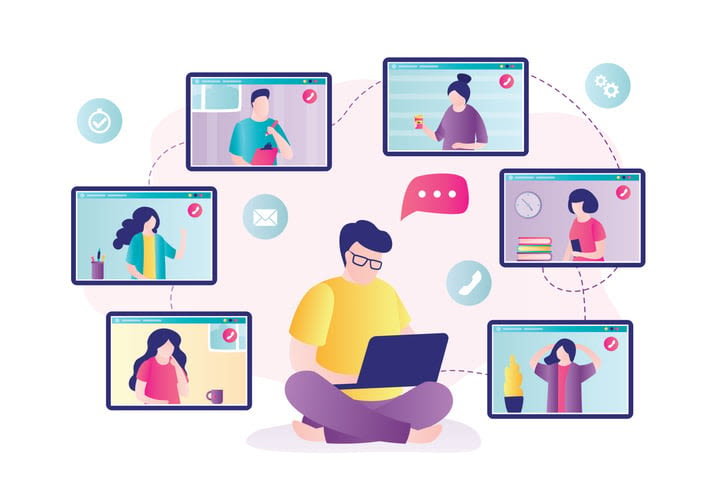Need to ace a remote job interview? This guide covers the top remote job interview questions and how to answer them.
Key Takeaways
- Remote job interviews now play a critical role in hiring processes for remote, on-site, and hybrid roles, necessitating adeptness in digital interaction.
- Candidates must be ready to discuss their remote work experience, including overcoming challenges, maintaining productivity, and managing a dedicated workspace.
- Effective communication skills and the ability to handle remote-specific situations, such as technical issues and conflict resolution, are essential for demonstrating suitability for remote positions.
Introduction
With the arrival of remote work, job interviews are changing. These virtual encounters are not limited to remote positions; they are often a prelude to on-site and hybrid roles. The rise of remote interviews makes mastering these digital dialogues an essential skill for job seekers.
With video conferencing tools bridging the distance, the ability to present oneself effectively from afar has never been more crucial. Kumospace is a powerful tool that helps small teams work highly effectively and overcome remote challenges in a fun and dynamic environment.
Key questions about remote work experience

Embarking on a remote job interview, expect to dive into discussions about your remote work history and the hurdles you’ve overcome in such an environment. Employers are eager to understand how prospective remote workers have adapted to the self-directed and digitally connected world of remote work. These inquiries are a litmus test of your compatibility with the telecommuting lifestyle and an indicator of your potential as a remote employee.
"Have you worked remotely before?"
When asked about your remote work history, honesty is your best policy. Reflect on how remote work complements your professional style, and don’t hesitate to share concrete examples (including freelance and volunteering) that demonstrate your proficiency.
Whether it’s about the seamless integration of remote work into your daily routine or how it has empowered you to deliver exceptional results, your response should paint a picture of an individual well-suited for the flexibility and challenges of working remotely.
"What challenges have you faced working remotely?"
Every remote worker faces their own set of challenges across hybrid and remote work, from isolation to navigating technical snags. Addressing these hurdles head-on during your interview showcases not just your resilience, but your knack for problem-solving. Employers are looking for candidates who are not only aware of the unique challenges presented by remote work but also proactive in developing strategies to conquer them.
Be prepared to share how you turned potential remote work pitfalls into stepping stones for professional growth.
Assessing your remote work environment

A pivotal part of any remote job interview revolves around your work environment. Recruiters are interested in whether you’ve carved out a dedicated space that fosters productivity. After all, your work setting is more than just a backdrop; it reflects your organizational skills and your commitment to maintaining a professional demeanor, even from the comfort of your home.
"Do you have a dedicated workspace?"
The presence of a dedicated workspace speaks volumes about your ability to stay focused and organized. It’s your fortress of solitude amidst the hustle and bustle of home life—a space where distractions are kept at bay. Illustrate how your workspace is designed to optimize productivity, perhaps with ergonomic furniture, adequate lighting, and a setting that signals to your brain: it’s time to work.
"What tools do you use for remote work?"
Your toolkit for remote work is as important as your workspace. Employers want to know whether you’re well-versed in digital office tools that facilitate remote collaboration. From project management platforms like Asana and Trello to communication staples like Slack and Zoom, your familiarity with these tools can significantly impact your ability to integrate smoothly into a remote team.
Communication skills in a remote setting

"How do you communicate with a remote team?"
Communication within a remote team is an art form that requires a balance between accessibility and autonomy. Share your experience with synchronous and asynchronous tools and channels, and explain how you leverage them to stay in sync with your team.
Whether your experience is a barrage of quick chats on Slack or a comprehensive email update approach, your types of communication should reflect a commitment to clarity and collaboration.
"How do you handle miscommunication in a remote environment?"
Miscommunication is an inevitable challenge in remote work, how you handle it is a sign of your collaborative prowess. Share your strategies for preempting misunderstandings and your tactics for resolving them when they arise. Whether it’s double-checking for clarity or reaching out for a quick video call to iron out the wrinkles, your methods should showcase your proactive stance and your dedication to maintaining harmony within the team.
Managing productivity and time

Time management and productivity are the twin pillars supporting successful remote work. In a setting where self-regulation is key, you must illustrate your ability to juggle tasks, adhere to deadlines, and navigate the autonomy that comes with remote work.
Let’s explore how you can convey your mastery of these essential skills during the interview process.
"How do you manage your time when working remotely?"
Effective time management in a remote setting often hinges on establishing a structured routine and utilizing the right tools. Discuss the methods you employ to prioritize tasks and allocate your hours to ensure peak productivity. Whether you adhere to a strict schedule or embrace flexibility to accommodate bursts of creativity, your approach should reflect a disciplined yet adaptable mindset.
"How do you stay motivated while working from home?"
Staying motivated, and motivating others, in the absence of a traditional office environment requires both commitment and creativity. Share your strategies for setting and achieving goals, as well as your techniques for infusing your day with energy and enthusiasm.
Whether through regular check-ins with colleagues or personal rituals that signal the start and end of the workday, your ability to maintain motivation is a key indicator of your suitability for remote work.
Dealing with distractions and maintaining focus

The home office is rife with potential distractions, from the lure of unmade beds to the siren call of the refrigerator. In a remote interview, you must articulate how you navigate these distractions and keep your gaze firmly fixed on your work.
Let’s discuss the tactics you can discuss to demonstrate your laser-like focus.
"What are common distractions you face at home?"
Identifying the usual culprits that disrupt your workflow is the first step in maintaining focus. From noisy neighbors to troublesome teens, discuss how you’ve established boundaries with your household and adopted practices such as using noise-canceling headphones to create an oasis of concentration.
Your ability to articulate these points conveys a clear understanding of the importance of a distraction-free work environment.
"How do you stay focused on your tasks?"
Staying focused despite the comforts of home requires discipline and strategy. Share how you employ techniques such as time-blocking or the Pomodoro Technique to stay on track.
Explain how you’ve structured your day to capitalize on your most productive hours and how you manage to keep the boundaries between ‘home’ and ‘work’ distinct and respected.
Handling remote work challenges

Remote work comes with its own set of challenges, from technical hiccups to the blending of personal and professional lives. Your ability to handle these issues affects your day-to-day work and speaks volumes about your adaptability and resilience.
Let’s discuss how to approach these topics in your remote interview process.
"How do you handle technical issues while working remotely?"
Technical difficulties can bring your workflow to a halt, but a well-prepared remote worker knows the value of having backups and quick fixes at the ready. Share how you’ve dealt with common issues like internet outages, security problems, or software glitches, and the contingency plans you have in place to minimize disruptions. Your resourcefulness in the face of technical adversity will not go unnoticed.
"How do you balance work and personal life?"
The blending of work and personal life is a common challenge for remote workers, and striking the right balance is crucial for long-term success. Discuss the boundaries you’ve set and the routines you’ve established to ensure that your professional responsibilities don’t encroach upon your personal time.
Your strategies for managing this balance will reveal your capacity for self-care and sustained productivity.
Collaboration and teamwork in remote jobs

Remote work doesn’t mean working in isolation; collaboration and teamwork remain as important as ever. In a remote setting, you’ll need to demonstrate how you contribute to a positive team culture and engage in collaborative efforts that span distances.
Let’s explore how you can communicate your experience as a team member with teamwork in a virtual environment.
"Have you worked with a distributed team?"
Working with a distributed team requires a unique set of skills and an understanding of navigating time zone differences and varying work schedules. Discuss how you’ve successfully integrated into such teams and your strategies to align with team goals and stay connected.
Your experience in this area can be a significant asset in a remote position.
"How do you ensure effective collaboration in a remote team?"
Effective collaboration in a remote team is built on clear communication, shared goals, and mutual respect. Share the platforms and practices you’ve used to foster teamwork, from collaborative project management tools to virtual brainstorming sessions.
Your ability to thrive in a collaborative remote environment will be a key selling point.
Evaluating fit for remote work culture

A company’s remote work culture is a tapestry of values, practices, and attitudes toward work. As a candidate, it’s essential to demonstrate how your personal work style and preferences align with this company's culture. The interview is your stage to articulate your suitability and eagerness to contribute to the remote work ecosystem, even if you’ve seen 10 companies’ About Us pages with exactly the same “culture” and stock art images of happy teams.
"Why do you want to work remotely?"
Understanding your own motivations for seeking remote work is a cornerstone of ensuring a good fit with a company’s culture. Reflect on the aspects of remote work that resonate with you, whether it’s the flexibility, reduced commute, or the ability to design a personalized work environment. Convey these motivations clearly and connect them to how they enhance your productivity and job satisfaction.
"What do you like and dislike about office work?"
Exploring your preferences for office work versus remote work can help an interviewer gauge your fit for their remote culture. Discuss the elements of office work you enjoy, such as collaboration and socialization, and how you replicate these in a remote setting.
Similarly, address the less appealing aspects and how remote work provides solutions to those issues. As ever, list specific examples where possible to gound your views in reality, rather than generalizing.
Handling remote job-specific situations

Remote work presents scenarios that may not typically arise in a traditional office setting, especially when working for a remote company. Your ability to navigate these situations, from managing and tracking projects remotely to resolving conflicts without face-to-face interaction, is critical for remote employees.
Let’s discuss how you can present your experience with these situations to highlight your competence in a remote role.
"Can you describe a project you managed remotely?"
Describing a project you’ve managed remotely offers a window into your organizational and leadership skills in a virtual setting. Share the specifics of the project, your role, and how you coordinated with your team to drive the project to success. Your narrative should underscore your ability to lead and execute effectively, regardless of physical location.
"How do you handle conflict resolution in a remote environment?"
Conflict resolution in a remote setting requires a deft touch and a keen understanding of virtual communication. Discuss how you’ve applied structured approaches like the STAR method to navigate conflicts and arrive at positive outcomes.
Your experience in handling remote teams in such situations demonstrates your capacity to maintain team cohesion.
Preparing for remote job interviews

Preparing for a remote job interview is about more than just rehearsing standard responses; it’s about showing your preparedness to thrive in a remote work setting. From technological readiness to demonstrating your understanding of the company’s culture, the preparation you undertake can set you apart as a candidate.
Let’s examine the steps you should take to ensure you’re ready to impress in your next virtual interview.
What questions should you ask the interviewer?
The questions you pose to your hiring manager can be just as telling as the answers you provide. Inquire about the company’s adaptation to remote work, opportunities for team-building among remote workers, and the onboarding process for virtual employees. These questions demonstrate your forward-thinking mindset and your interest in becoming an integral part of the team, even from a distance.
- If they are a services firm, ask about their tech roadmap and strategic plans
- Ask how many new employees they have hired in the last year
- Ask how the team your would work with currently operates and what changes are planned
- Don’t be afraid to ask about their funding and viability
How to prepare for a virtual interview
A virtual interview requires a blend of preparation and presentation. Here are some tips to help you succeed:
- Ensure your technology is up to par.
- Make sure your interview space is professional and free from distractions.
- Dress appropriately for the interview.
- Familiarize yourself with the virtual platform to avoid technical snags.
- Convey positive body language throughout the interview.
By following these tips, you’ll be well-prepared for your virtual interview.
By paying attention to these details, you convey your seriousness about the role and your readiness to be a remote professional.
Summary
As we wrap up this comprehensive guide, remember that the key to acing a remote job interview lies in demonstrating your proficiency with remote work practices, your communication skills, and your fit within a remote work culture. From showcasing your home office to articulating your conflict resolution strategies, every aspect of your interview is an opportunity to highlight your suitability for a remote role. Embrace these insights, and step into your next virtual interview with confidence and clarity, ready to land that coveted remote position.
Frequently Asked Questions
The most important qualities for a remote worker are self-discipline, strong communication skills, proficiency with remote tools, adaptability, and effective time management. These qualities are essential for success in a remote work environment.
During the interview, showcase specific remote projects, discuss challenges you've tackled, and highlight your use of remote collaboration tools. This will demonstrate your remote work experience effectively.
Your home office setup should convey professionalism, organization, and a distraction-free environment to create a productive impression during a remote job interview.
To demonstrate your communication skills for a remote job, share examples of using remote communication tools, addressing miscommunications, and maintaining clarity in virtual interactions. This will showcase your ability to communicate effectively in a remote work setting. Mention using or testing tools like Kumospace alongside typical apps like Slack to highlight your interest in remote collaboration.
To maintain a healthy work-life balance as a remote worker, it's essential to establish clear boundaries, create routines, communicate your needs to your team, and prioritize self-care. Remember that your well-being is crucial for productivity and happiness.





